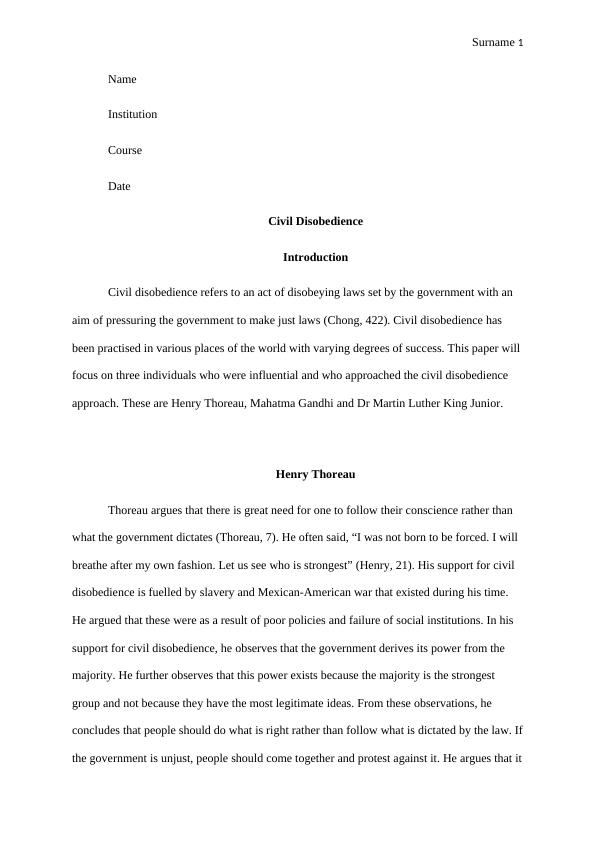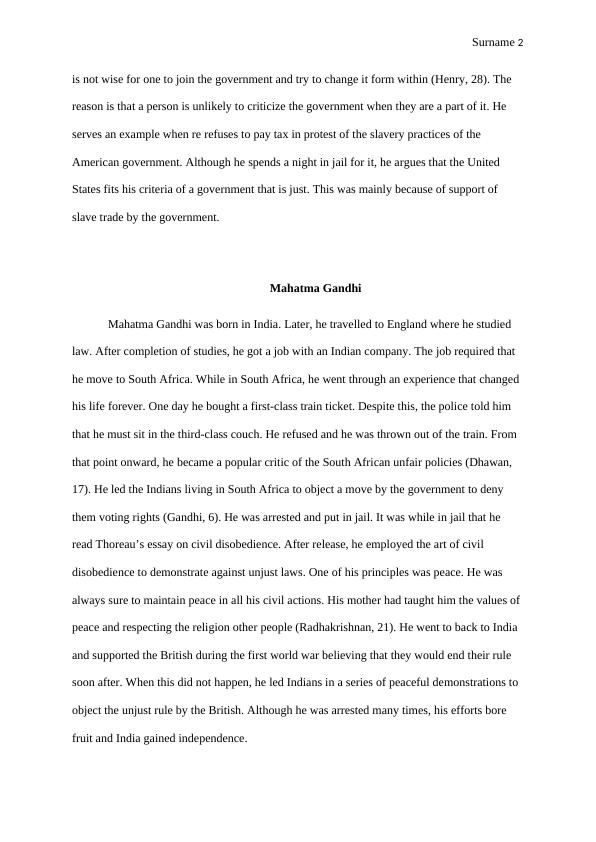Civil Disobedience: A Comparative Analysis of Thoreau, Gandhi and Dr Martin Luther King
Added on 2023-05-29
5 Pages1377 Words98 Views
Surname 1
Name
Institution
Course
Date
Civil Disobedience
Introduction
Civil disobedience refers to an act of disobeying laws set by the government with an
aim of pressuring the government to make just laws (Chong, 422). Civil disobedience has
been practised in various places of the world with varying degrees of success. This paper will
focus on three individuals who were influential and who approached the civil disobedience
approach. These are Henry Thoreau, Mahatma Gandhi and Dr Martin Luther King Junior.
Henry Thoreau
Thoreau argues that there is great need for one to follow their conscience rather than
what the government dictates (Thoreau, 7). He often said, “I was not born to be forced. I will
breathe after my own fashion. Let us see who is strongest” (Henry, 21). His support for civil
disobedience is fuelled by slavery and Mexican-American war that existed during his time.
He argued that these were as a result of poor policies and failure of social institutions. In his
support for civil disobedience, he observes that the government derives its power from the
majority. He further observes that this power exists because the majority is the strongest
group and not because they have the most legitimate ideas. From these observations, he
concludes that people should do what is right rather than follow what is dictated by the law. If
the government is unjust, people should come together and protest against it. He argues that it
Name
Institution
Course
Date
Civil Disobedience
Introduction
Civil disobedience refers to an act of disobeying laws set by the government with an
aim of pressuring the government to make just laws (Chong, 422). Civil disobedience has
been practised in various places of the world with varying degrees of success. This paper will
focus on three individuals who were influential and who approached the civil disobedience
approach. These are Henry Thoreau, Mahatma Gandhi and Dr Martin Luther King Junior.
Henry Thoreau
Thoreau argues that there is great need for one to follow their conscience rather than
what the government dictates (Thoreau, 7). He often said, “I was not born to be forced. I will
breathe after my own fashion. Let us see who is strongest” (Henry, 21). His support for civil
disobedience is fuelled by slavery and Mexican-American war that existed during his time.
He argued that these were as a result of poor policies and failure of social institutions. In his
support for civil disobedience, he observes that the government derives its power from the
majority. He further observes that this power exists because the majority is the strongest
group and not because they have the most legitimate ideas. From these observations, he
concludes that people should do what is right rather than follow what is dictated by the law. If
the government is unjust, people should come together and protest against it. He argues that it

Surname 2
is not wise for one to join the government and try to change it form within (Henry, 28). The
reason is that a person is unlikely to criticize the government when they are a part of it. He
serves an example when re refuses to pay tax in protest of the slavery practices of the
American government. Although he spends a night in jail for it, he argues that the United
States fits his criteria of a government that is just. This was mainly because of support of
slave trade by the government.
Mahatma Gandhi
Mahatma Gandhi was born in India. Later, he travelled to England where he studied
law. After completion of studies, he got a job with an Indian company. The job required that
he move to South Africa. While in South Africa, he went through an experience that changed
his life forever. One day he bought a first-class train ticket. Despite this, the police told him
that he must sit in the third-class couch. He refused and he was thrown out of the train. From
that point onward, he became a popular critic of the South African unfair policies (Dhawan,
17). He led the Indians living in South Africa to object a move by the government to deny
them voting rights (Gandhi, 6). He was arrested and put in jail. It was while in jail that he
read Thoreau’s essay on civil disobedience. After release, he employed the art of civil
disobedience to demonstrate against unjust laws. One of his principles was peace. He was
always sure to maintain peace in all his civil actions. His mother had taught him the values of
peace and respecting the religion other people (Radhakrishnan, 21). He went to back to India
and supported the British during the first world war believing that they would end their rule
soon after. When this did not happen, he led Indians in a series of peaceful demonstrations to
object the unjust rule by the British. Although he was arrested many times, his efforts bore
fruit and India gained independence.
is not wise for one to join the government and try to change it form within (Henry, 28). The
reason is that a person is unlikely to criticize the government when they are a part of it. He
serves an example when re refuses to pay tax in protest of the slavery practices of the
American government. Although he spends a night in jail for it, he argues that the United
States fits his criteria of a government that is just. This was mainly because of support of
slave trade by the government.
Mahatma Gandhi
Mahatma Gandhi was born in India. Later, he travelled to England where he studied
law. After completion of studies, he got a job with an Indian company. The job required that
he move to South Africa. While in South Africa, he went through an experience that changed
his life forever. One day he bought a first-class train ticket. Despite this, the police told him
that he must sit in the third-class couch. He refused and he was thrown out of the train. From
that point onward, he became a popular critic of the South African unfair policies (Dhawan,
17). He led the Indians living in South Africa to object a move by the government to deny
them voting rights (Gandhi, 6). He was arrested and put in jail. It was while in jail that he
read Thoreau’s essay on civil disobedience. After release, he employed the art of civil
disobedience to demonstrate against unjust laws. One of his principles was peace. He was
always sure to maintain peace in all his civil actions. His mother had taught him the values of
peace and respecting the religion other people (Radhakrishnan, 21). He went to back to India
and supported the British during the first world war believing that they would end their rule
soon after. When this did not happen, he led Indians in a series of peaceful demonstrations to
object the unjust rule by the British. Although he was arrested many times, his efforts bore
fruit and India gained independence.

End of preview
Want to access all the pages? Upload your documents or become a member.
